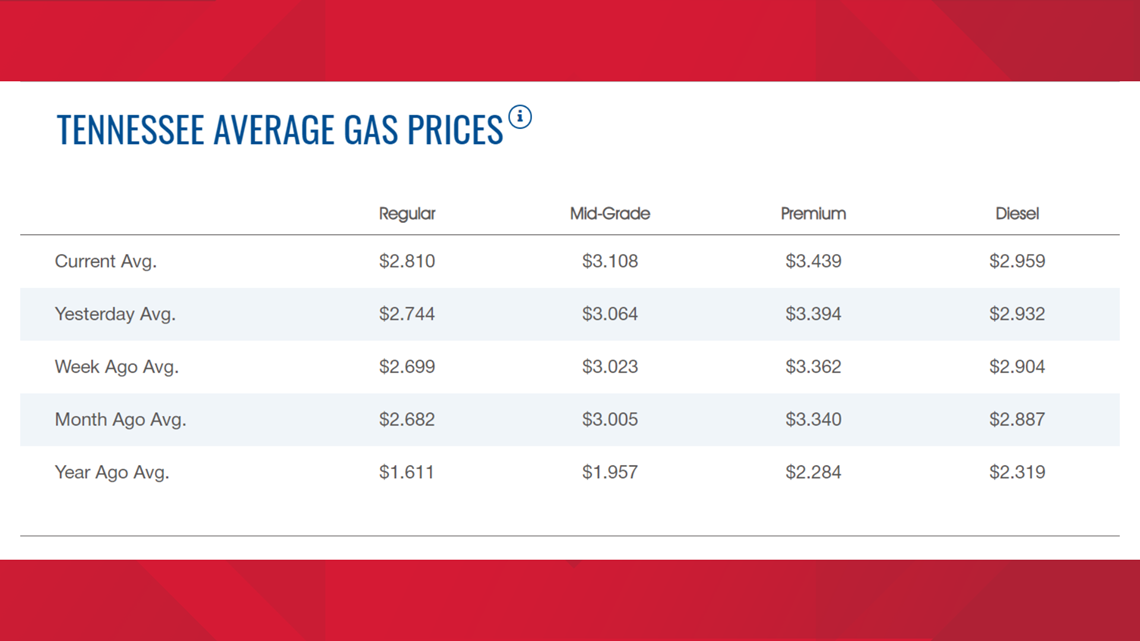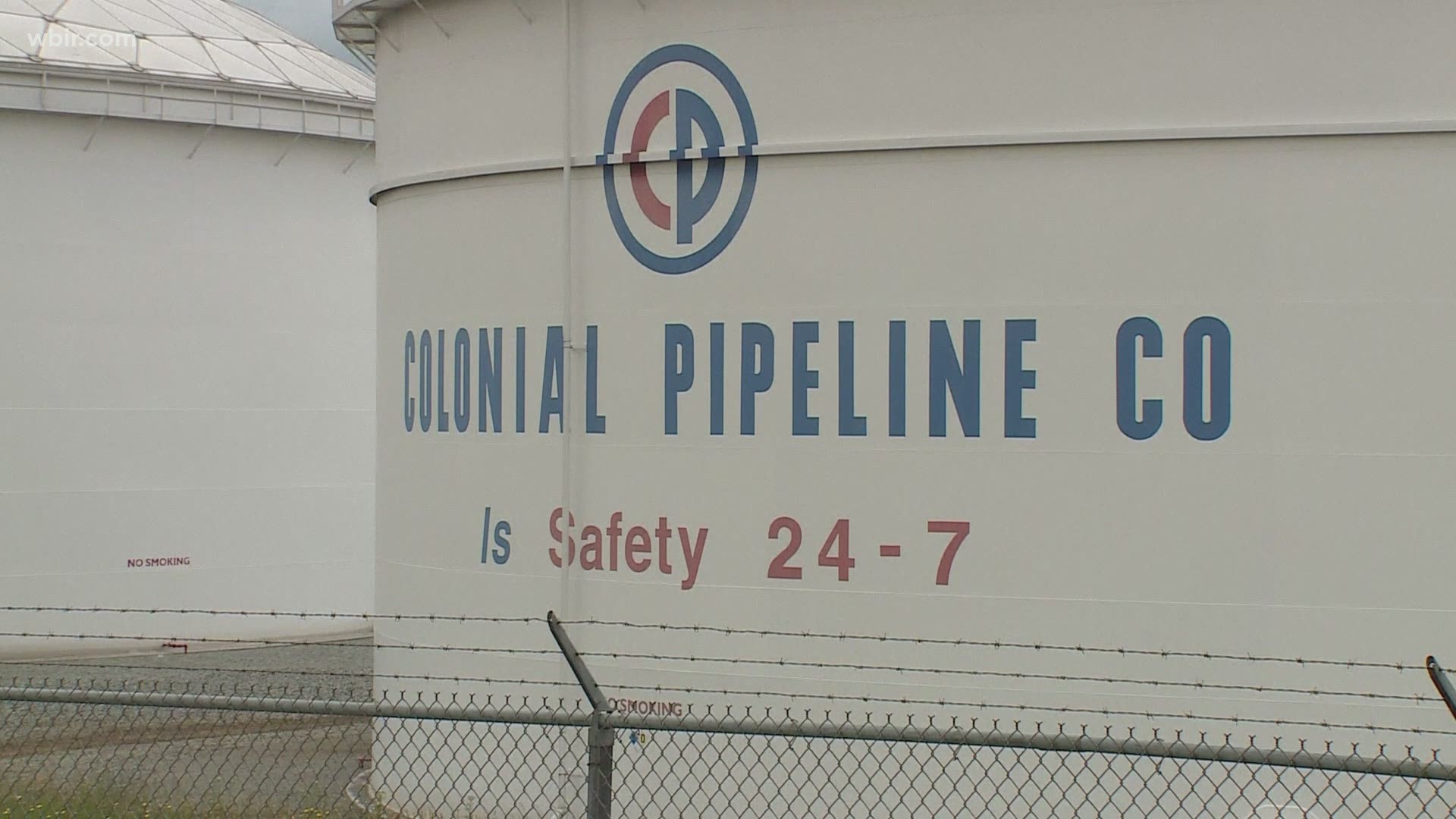TENNESSEE, USA — AAA said that the national average price for a gallon of gasoline ticked above $3 for the first time since 2016 Wednesday. But in Tennessee, the current average price for a gallon of regular gas is still below that mark.
Prices begin to rise around this time every year and the AAA auto club said Wednesday that the average price nationally hit $3.008 nationally.
Gas prices have risen slightly in the Knoxville market, according to AAA.
In Knoxville on Thursday, the average price for a gallon of regular is now $2:85, according to AAA. That's an increase of six cents from Wednesday and fifteen cents from a week ago.
A month ago, we were paying $2.66 for a gallon of regular, and this time last year it was $1.49.


State and federal officials are scrambling to find alternate routes to deliver gasoline in the Southeast U.S. after a hack of the nation’s largest fuel pipeline led to panic-buying that contributed to more than 1,000 gas stations running out of fuel.
There is no national gasoline shortage, but if the pipeline shutdown continues past the weekend, it could create broader fuel disruptions. But so many people rushing to the pumps to fuel up, even when they don't need to, is putting a strain on the supply.
The Colonial Pipeline, which delivers about 45% of what is consumed on the East Coast, was hit on Friday with a cyberattack by hackers who lock up computer systems and demand a ransom to release them. The attack raised concerns, once again, about the vulnerability of the nation’s critical infrastructure.
A large part of the pipeline resumed operations manually late Monday, and Colonial anticipates restarting most of its operations by the end of the week, U.S. Energy Secretary Jennifer Granholm said.
However, the disruption is taking place at the time of year when Americans begin to become more mobile, especially as the nation emerges from the pandemic.
Gas stations in East Tennessee are feeling the impact of the Colonial Pipeline cyber attack. The Secretary of Energy said that about 70% of Tennessee's fuel comes from that pipeline.
"So the more that people fuel up unnecessarily or fuel up more than they could possibly need in the next week, that will only make the problem worse for everyone," said Megan Cooper, AAA spokesperson.
Knoxville-based Pilot said in a statement Tuesday night that it is closely monitoring the "rapidly deteriorating situation" with the pipeline and the increased demand for gas.
"Due to the unexpected spikes in consumption, there is increased strain on the supply chain and we are working hard to quickly address any temporary shortages. In Knoxville, our Pilot Flying J Travel Centers and Pilot Convenience Stores remain open with adequate fuel supply at this time," said Brad Jenkins, Senior VP of Supply and Distribution. "Pilot Company will continue to do everything we can, including bringing in resources from unaffected areas, to resupply our travel centers with gas and diesel to serve our guests and professional drivers."
Gasbuddy.com tracks gas prices and availability at pumps across the country, based on user reports. If you need gas, you may want to check out the site to see availability near you.
It's important to note that there’s no imminent shortfall, and thus no need to panic buy gasoline, Richard Joswick, head of global oil analytics at S&P Global Platts, said. If the pipeline is restored by Friday, there won’t be much of an issue.
“If it does drag on for two weeks, it’s a problem,” Joswick added. “You’d wind up with price spikes and probably some service stations getting low on supply. And panic buying just makes it worse.”
Colonial said it's likely to restore service on the majority of its pipeline by Friday.
The AAA expects more than 37 million people to travel at least 50 miles from home during the Memorial Day weekend, up 60% from last year, which was the lowest since AAA began keeping records in 2000.
Multiple U.S. agencies are coordinating efforts to avert any potential shortage, should they arise.
The White House said Wednesday that the Department of Transportation is now allowing Alabama, Georgia, Kentucky, Louisiana, Maryland, Mississippi, New Jersey, North Carolina, Tennessee, and Virginia to use interstate highways to transport overweight loads of gasoline and other fuels under existing disaster declarations.
The department’s Maritime Administration completed a review of potential actions available under the Jones Act, a U.S. maritime law that requires shipments between U.S. ports, including fuel, to be moved by American-flagged ships.
The Department of Homeland Security is prepared to review any temporary Jones Act waiver requests from companies if there is not sufficient capacity to get to regions suffering fuel shortages, said White House press secretary Jen Psaki on Wednesday.

